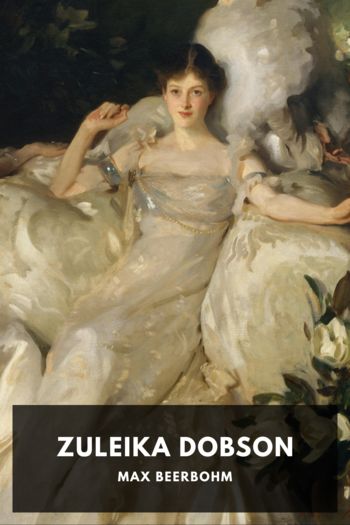The Works of Max Beerbohm - Max Beerbohm (electric book reader .txt) 📗

- Author: Max Beerbohm
Book online «The Works of Max Beerbohm - Max Beerbohm (electric book reader .txt) 📗». Author Max Beerbohm
It is not hard to see how, in the effort to give Mr. Brummell his due place in history, Monsieur D’Aurevilly came to grief. It is but strange that he should have fallen into a rather obvious trap. Surely he should have perceived that, so long as Civilisation compels her children to wear clothes, the thoughtless multitude will never acknowledge dandyism to be an art. If considerations of modesty or hygiene compelled everyone to stain canvas or chip marble every morning, painting and sculpture would in like manner be despised. Now, as these considerations do compel everyone to envelop himself in things made of cloth and linen, this common duty is confounded with that fair procedure, elaborate of many thoughts, in whose accord the fop accomplishes his toilet, each morning afresh, Aurora speeding on to gild his mirror. Not until nudity be popular will the art of costume be really acknowledged. Nor even then will it be approved. Communities are ever jealous (quite naturally) of the artist who works for his own pleasure, not for theirs—more jealous by far of him whose energy is spent only upon the glorification of himself alone. Carlyle speaks of dandyism as a survival of “the primeval superstition, self-worship.” “La vanité,” are almost the first words of Monsieur D’Aurevilly, “c’est un sentiment contre lequel tout le monde est impitoyable.” Few remember that the dandy’s vanity is far different from the crude conceit of the merely handsome man. Dandyism is, after all, one of the decorative arts. A fine ground to work upon is its first postulate. And the dandy cares for his physical endowments only in so far as they are susceptible of fine results. They are just so much to him as to the decorative artist is inilluminate parchment, the form of a white vase or the surface of a wall where frescoes shall be.
Consider the words of Count D’Orsay, spoken on the eve of some duel, “We are not fairly matched. If I were to wound him in the face it would not matter; but if he were to wound me, ce serait vraiment dommage!” There we have a pure example of a dandy’s peculiar vanity—“It would be a real pity!” They say that D’Orsay killed his man—no matter whom—in this duel. He never should have gone out. Beau Brummell never risked his dandyhood in these mean encounters. But D’Orsay was a wayward, excessive creature, too fond of life and other follies to achieve real greatness. The power of his predecessor, the Father of Modern Costume, is over us yet. All that is left of D’Orsay’s art is a waistcoat and a handful of rings—vain relics of no more value for us than the fiddle of Paganini or the mask of Menischus! I think that in Carolo’s painting of him, we can see the strength, that was the weakness, of le jeune Cupidon. His fingers are closed upon his cane as upon a sword. There is mockery in the inconstant eyes. And the lips, so used to close upon the wine-cup, in laughter so often parted, they do not seem immobile, even now. Sad that one so prodigally endowed as he was, with the three essentials of a dandy—physical distinction, a sense of beauty and wealth or, if you prefer the term, credit—should not have done greater things. Much of his costume was merely showy or eccentric, without the rotund unity of the perfect fop’s. It had been well had he lacked that dash and spontaneous gallantry that make him cut, it may be, a more attractive figure than Beau Brummell. The youth of St. James’s gave him a wonderful welcome. The flight of Mr. Brummell had left them as sheep without a shepherd. They had even cried out against the inscrutable decrees of fashion and curtailed the height of their stocks. And (lo!) here, ambling down the Mall with tasselled cane, laughing in the window at White’s or in Fop’s Alley posturing, here, with the devil in his eyes and all the graces at his elbow, was D’Orsay, the prince paramount who should dominate London and should guard life from monotony by the daring of his whims. He accepted so many engagements that he often dressed very quickly both in the morning and at nightfall. His brilliant genius would sometimes enable him to appear faultless, but at other times not even his fine figure could quite dispel the shadow of a toilet too hastily conceived. Before long he took that fatal step, his marriage with Lady Harriet Gardiner.





Comments (0)